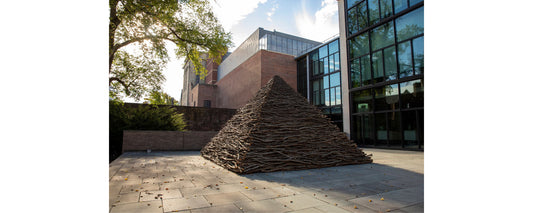The word “pivot” may bring to mind an iconic scene from Friends, in which Ross, Rachel and Chandler attempt to move a couch up a U-shaped staircase while Ross shouts, “Pivot! Pivot! Pivot!” The term has become a “buzz word” among theater professionals this year, says Anthony Lupinacci of the Shubert Theatre. But unlike the Friends sketch, pandemic-forced turnarounds have been anything but funny for local theaters, which have gone dark, lost their seasons and, in many cases, laid off staff. Each has come up with a different way to muscle through the task.
The Shubert had just finished a run of the revival of Cats when Governor Ned Lamont’s shutdown orders went into effect last March. Within days, the Shubert went from “having six performances of people actively in the theater to shutdown,” Lupinacci says. While the shutdown persists, the Shubert has filled the void with ticketed virtual content: a film and panel discussion on the late civil rights activist and congressman John Lewis, a jazz concert titled The Sounds of Democracy, a full slate of holiday shows. Staff also put on three interactive fundraisers, a local food drive and a virtual summer camp. “I think virtual programming is going to be, somehow, part of everything we do moving forward,” says Carla Sullivan, vice president of external relations. “There are going to be some people who want that option, prefer that option.”
Ticket prices for the Shubert’s online programming have run between $20 and $50 per access, which may cover several viewers. But streaming shows hasn’t been so much about making money, Lupinacci says. “It was more about we need a way to stay connected with our patrons… We want to do our part and support them in some way by bringing them entertainment because that’s what we do.”
Long Wharf Theatre has taken a different tack, introducing a membership model that comes with perks such as early access to tickets, local restaurant discounts and Play Club, a book club for reading plays. Replacing season subscriptions with memberships was “something that we had started to explore,” says artistic director Jacob Padrón, “but I think the need to pivot really then made it clear that we had to do something different.” Sustaining memberships cost $10 per month or, for $150 upfront, a “One City” household membership provides “the same access and perks but with a higher one-time payment to provide extra support to our season, right from the start,” Long Wharf’s website says.
“One City” refers to this season’s tag line—One City, Many Stages—which reflects Long Wharf’s desire to be responsive to and immersed in the community. “The theater doesn’t just have to exist at Sargent Drive in a space with four walls,” Padrón says. “
In some ways, virtual programming has made it easier for Long Wharf to be, as Padrón puts it, “emergent and responsive and adaptive… to the world around us.” At the same time, the long view is getting its due. “We’ve been able to really double down on our commitment to the development of new work” for the future, he says.
The advantage Elm Shakespeare Company has compared to both the Shubert and Long Wharf is its smaller size. With a full-time paid staff of two plus two part-timers and no building to maintain, ESC has arguably shoved the proverbial couch to the top of the stairs. Once Rebecca Goodheart, producing artistic director, and Sarah Bowles, education program manager, figured out how to move online, ESC brought its usual programming to nearly 500 New Haven children at Mauro-Sheridan Interdistrict Magnet School, Common Ground High School and its own Teen Troupe, which performed scary scenes from Shakespeare live in Edgerton Park on Halloween night. That show was so popular, Goodheart says, that it will become a new ESC tradition in some form. The company also took on a new project with Ice the Beef Youth, who will perform Romeo and Juliet in 2021, and created a series of free performances and panels titled Building a Brave New Theatre that brought together a national roster of Shakespeare performers, directors and scholars to discuss issues of race in the Bard’s plays. The series was “a win,” Goodheart says, and two more events are planned for February.
What didn’t make it to the stage was ESC’s usual large-scale summer production in the park, although grants and government support allowed them to honor the contracts of everyone who had signed on by April. As for next summer, Goodheart is hopeful. “I don’t think we’ll be allowed to have large gatherings yet,” she says. “We would need to scale it
Yet another solution emerged at Yale Repertory Theatre this season: put the couch down, sit on it and spend some time thinking about how you might rebuild the entire staircase. Like the Shubert and Long Wharf, Yale Rep has a building and a big staff to support. It also has the deepest pockets. Graduate students in the three-year MFA program were offered an additional year of study free of charge to make up for lost opportunities. A press release in June announced that taking a break would allow the repertory to pursue “a new paradigm, and include deeper investment in the anti-racism work that must be at the heart of our training.” At the same time, graduate student members of Yale Cabaret have pushed forward with their own season, offering a planned 15 “groundbreaking” works. Operating, like Long Wharf, on memberships (ranging from $15 to $70, with single tickets running $4.50 to $6), Yale Cab has also mounted a Black Theater Festival, an online gallery of bonus works and retooled favorites like potlucks and the upcoming Dragaret and Satellite Festival.
One of the most painful results of dark stages has been layoffs of about 60% of staff at both Long Wharf and the Shubert, not to mention the loss of the professionals all of the theaters normally hire for each show. Even at Yale Rep, salaries were frozen, overtime was eliminated and reduced class offerings left about 20% of visiting faculty without work. However, mid-pandemic, ESC has actually expanded its local staff to meet increasing demand for its programs, hiring Ben Curns, an actor and director who teaches at Southern Connecticut State University, as a part-time resident teaching artist. And Long Wharf recently announced it’s hiring local arts leader Aleta Staton to fill the position of Director of Learning & Community Organizing.
No matter their solutions to COVID’s challenges, the city’s theater professionals have done exactly what they know how to do best: solve problems creatively. “What we do is figure out how to do the impossible with nothing,” Goodheart says. “How do you create magic with a bare black box and four bodies, you know?” That creative grit, she says, is “how theater will survive. It’s how it’s survived for 2,000 years.”
Written by Kathy Leonard Czepiel. Photographed by Dan Mims.







